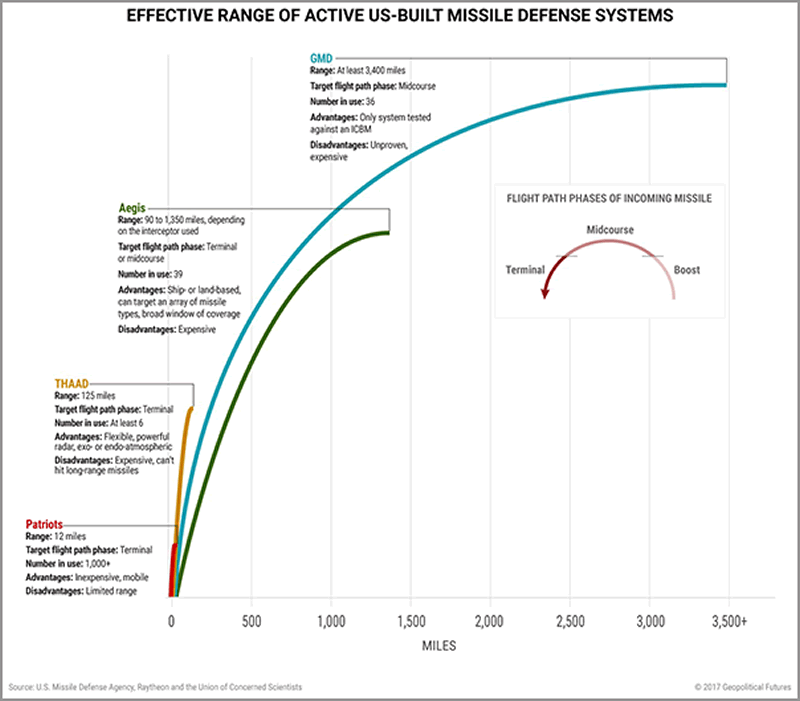Why US Missile Defense Won’t Likely Protect Us from a North Korea Attack
Politics / North Korea Sep 21, 2017 - 02:31 PM GMTBy: John_Mauldin
 BY GEOPOLITICAL FUTURES : The prospect that North Korea could fire missiles at its enemies has shed light on ways potential targets could defend themselves. And when it comes to missiles, some say the best defense is more missiles.
BY GEOPOLITICAL FUTURES : The prospect that North Korea could fire missiles at its enemies has shed light on ways potential targets could defend themselves. And when it comes to missiles, some say the best defense is more missiles.
Ballistic missile defense (BMD) seems like a natural antidote, and though these systems have been in use for some time—and some have even intercepted their targets—the security they promise could hardly be considered absolute.
The US began to pour money into ballistic missile defense systems (BMD) as soon as it showed the destructive power of nuclear weapons at the end of World War II.
BMD became a fixture of US defense planning throughout the Cold War, with investment peaking under President Ronald Reagan’s Strategic Defense Initiative during the mid-1980s.
Eventually, the amount of money needed to counter advanced arsenals from countries like Russia and China was deemed unsustainable. So after the collapse of the Soviet Union, the focus on missile defense shifted to emerging, more limited threats from so-called rogue states like Iran, Iraq, and North Korea.
Since 2002, the US has spent between $8 billion and $10 billion annually on research, testing, and deployment of BMD systems.
Missile Defense Systems and Their Limited Capabilities
The workhorse of US missile defense is the Patriot system, the only US system to have been used in combat. Despite its limitations, the system would see the heaviest use against short-range North Korean threats launched from just across the border.
Like the Patriot system, the Terminal High Altitude Area Defense system, or THAAD, targets incoming missiles during the terminal phase using land-based batteries. In a conflict with North Korea, it would be used in tandem with the Patriots to provide two-tiered point defense against vulnerable civilian and military targets in South Korea and Guam.
The next, most flexible layer of defense is provided by the Aegis BMD system. The system is adaptable to address a broad range of threats, whether from short-, medium- or intermediate-range missiles, in either the endo-atmospheric or the exo-atmospheric stage.
Most Aegis systems are deployed aboard naval cruisers and destroyers, affording the US and Japan (which has six such warship-based systems) further flexibility to adapt to evolving threat environments.
The fourth, newest and perhaps most ambitious BMD layer is the Ground-Based Midcourse Defense system, which has been in development only since 2003. More than any of the other systems, the long-term hope for the Ground-Based Midcourse Defense system is that it will be capable of targeting longer-range missiles, including ICBMs.
Here’s everything summed up in a graph for quick reference:

BMD Will Not Make the Choice Facing the US Any Easier
Advancements in BMD could have a major effect on the battlefield and could limit the casualties in a war. But the technology is too limited, expensive, and technically and operationally unproven in combat situations to eliminate the threat posed by North Korea.
And so long as there is a reasonable chance of even one nuclear warhead penetrating defenses, the strategic calculations of the US and its allies will be effectively the same as if missile defense didn’t exist at all.
Grab George Friedman's Exclusive eBook, The World Explained in Maps
The World Explained in Maps reveals the panorama of geopolitical landscapes influencing today's governments and global financial systems. Don't miss this chance to prepare for the year ahead with the straight facts about every major country’s and region's current geopolitical climate. You won't find political rhetoric or media hype here.
The World Explained in Maps is an essential guide for every investor as 2017 takes shape. Get your copy now—free!
John Mauldin Archive |
© 2005-2022 http://www.MarketOracle.co.uk - The Market Oracle is a FREE Daily Financial Markets Analysis & Forecasting online publication.



